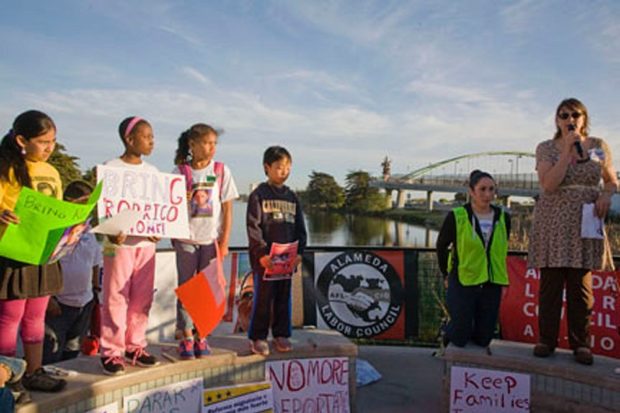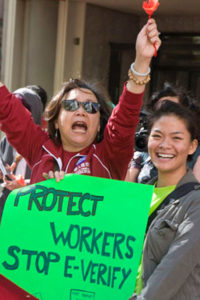
By David Bacon
(Editor’s note: The following is an excerpt. The entire article may be viewed at www.truth-out.org/news/item/15788-demands-rise-on-congress-to-guarantee-immigrant-rights.)
In San Diego, nine activists completed six days of a hunger strike outside the Mission Valley Hilton Hotel on April 10—the day demonstrations took place across the United States demanding immigration reform. Hunger strikers were protesting the firing of 14 of the hotel’s workers, after Evolution Hospitality, the company operating the Hilton franchise, told them that it had used the government’s E-Verify database to determine that they didn’t have legal immigration status.
“The company says that E-Verify is making them do this, even though many of the workers have been working here for years,” said Sara Garcia, a supporter and hunger striker from House of Organized Neighbors, a local community organization. “But they started firing them when the workers were organizing a union.”
“I clean 16 to 18 rooms a day, and they pay me $8.65 an hour. No one can live on that,” explained Leticia Nava, a fired worker. “I’m a widow with three children who depend on me. What is happening is not just. We are immigrant workers, and the only thing we’re asking is to work. That’s not hurting anyone.”
Nava and Garcia joined the tens of thousands of immigrants and immigrant rights activists who demonstrated on April 10, calling for the reform of U.S. immigration laws. Yet on the same day, legislators drafting reform proposals in the U.S. Senate proposed changes that would make Nava’s experience more widespread than ever, which were then contained in a bill they introduced a week later.
Congress proposes to exact a price for the legalization of undocumented immigrants. The “Gang of Eight” senators drafting the reform bill announced they intend to expand the E-Verify system to cover all employers, and make its use mandatory. This was only one of a number of measures that would increase the severity of many of the anti-immigrant measures already part of U.S. law.
The Hilton workers and their supporters, as well as the union helping them, UniteHere, all believe that immigration reform should include a legalization process. They want reform that would give the 11 million–12 million undocumented people living in the United States a quick and accessible way to gain legal status.
The senators, however, are proposing a plan that would require undocumented people to spend a decade in a provisional status before even being able to apply for permanent legal residence. Then they would have to maintain that status for another three years before they could apply to become citizens and gain basic political rights. The citizenship process is so overloaded that processing applications now takes months, even years. And instead of anticipating the logistical bottleneck of millions of people applying for citizenship at the same time, the senators declared that legalization applicants would get no dedicated process.
People seeking legal status would have to “get in the back of the line”—their visa applications would be processed only after all other pending applications. That could have people waiting even more years. Today, the government is still processing visa applications for some relatives of U.S. citizens and residents that were filed more than two decades ago. The undocumented would only become eligible for residence if they learned English and were continuously employed for 10 years, or were family members of someone who was.
The senators further announced they would charge each applicant a penalty of $500 to file an application, another $500 six years later and a further $1,000 before they could apply for residence, on top of fees to cover the costs of the program. The idea of long waiting periods and obstacles was criticized by AFL-CIO President Richard Trumka, who warned that “families, including siblings and children, must not pay the price of our broken policies.”
An even greater shift in U.S. immigration policy is in the works, however. The senators chipped away at the family preference system itself. They announced that there would no longer be a category allowing visa applications for the brothers and sisters of U.S. citizens. At the same time, their bill would create a new program eventually giving 120,000 visas a year to people with the work skills demanded by U.S. employers, rated on a point system. The undocumented could apply for these “merit-based” visas but would compete against others.

This moves U.S. immigration policy backward in time. Through the cold war, it was structured to allow employers to bring workers, called braceros, to labor on the railroads and in the fields. At the same time, ferocious immigration enforcement led to the deportation of as many as a million immigrants a year—called “wetbacks”—who tried to work outside of that guest worker program. The civil rights movement abolished the bracero program, and with the 1965 Immigration and Naturalization Act, a family based system replaced it.
Even more direct labor supply schemes will be part of the senators’ bill. Currently, the three main official guest worker visa programs, H1B, H2A and H2B, allow employers to recruit about 250,000 workers outside the country every year and bring them with visas that require them to work in order to stay. Some allow workers to change jobs (H1B), whereas others require them to remain with the employer who contracted them (H2A and H2B). Some, but not all, visa programs require employers to recruit locally first (H2A) and allow workers to eventually apply for residence (H1B).
In parallel with the senators’ deliberations, the AFL-CIO and the U.S. Chamber of Commerce announced agreement on yet another such program, called the W visa. It would allow employers to recruit workers to fill labor shortages documented by a new federal commissioner, require them to recruit locally first and peg wages of guest workers to an employer’s existing wage scale or to prevailing wages in the industry in which they’re recruited. Workers would be able to change jobs but could not remain out of work for longer than 60 days or they’d have to leave the country.
Ana Avendaño, assistant to AFL-CIO President Trumka and director of immigration and community action for the AFL-CIO, wrote that under this proposal “employers have the comfort of knowing that, as the economy picks up, workers—foreign or domestic—will be available to fill jobs that will fuel economic growth. Workers have the comfort of knowing that local workers will have the chance to apply for those jobs.”
Making a deal on a new guest worker program is a means to win over Republican senators and representatives who respond to employer lobbying. In its mobilization efforts around the country, the AFL-CIO and other Washington, D.C.–based lobbying groups have announced their central priority is a “pathway to citizenship”—that is, a legalization program for the undocumented.

This goal is painted in broad strokes. “There is absolutely no distinction,” said President Trumka at an event kicking off an April 10 rally, “between workers who were born in this country and those who came here to build a better life. We’re all in the same boat, every one of us who works for a living. We rise or fall together.”
Other organizations, however, have been critical of those aspects of the senators’ plan that will increase enforcement and expand labor supply programs. Communications Workers of America President Larry Cohen warned that “CWA will monitor any proposed changes to visa programs like the H-1B visa, which are sought after by business but have cost U.S. technicians and other workers tens of thousands of jobs.” The Senate bill would raise the numerical limit on those visas. Columbia professor and former labor organizer Mae Ngai noted in the New York Times, “From the agricultural ‘Bracero Program’ of the 1940s and ’50s to the current H-2 visa for temporary unskilled labor, these programs are notorious for employer abuse.”
In Washington State, Rosalinda Guillen, director of Community2Community, a farmworker group that organizes cooperatives and advocates for immigrant rights, worried that once undocumented agricultural laborers gained legal status they would face competition from guest workers brought into the country by growers. She noted that the state’s agricultural lobby is pushing intensely for guest workers. The Senate bill transforms the existing H2A agricultural guest worker program into two new ones—W2 and W3—and sets up a special legalization process for farmworkers in exchange for making the programs more attractive to growers.
“Farm workers deserve an opportunity to begin building healthy sustainable careers in the food system,” she explained. “As long as corporate agriculture is allowed to legally bring in an exploitable workforce, our food system will continue to decline and farm worker families will continue to be the lowest paid workers in the country, working one of the most dangerous jobs, so consumers can eat cheap food and corporations can continue to get richer!”
A recent study found the federal government spends more on border and immigration enforcement than on all other law enforcement agencies combined. The bill drafted by the Senate Gang of Eight would spend at least another $3.5 billion immediately on border enforcement, with the possibility of $2 billion more later. It would include building more walls and using drones and other means of electronic surveillance.
Rev. Deborah Lee of the Interfaith Coalition predicts that unions and immigrant rights organizations may eventually be divided over whether to support Congressional reform proposals because they call for vastly increased enforcement. “A lot of families are suffering now because of earlier immigration deals trading legalization for enforcement. We need to think long term—if the deals today are going to create more problems for families in the future.”
*****
David Bacon is an award-winning photojournalist, author, labor organizer and activist for immigrant rights. Mike Davis calls him “the conscience of American journalism.” For more articles and images, visit http://dbacon.igc.org.
